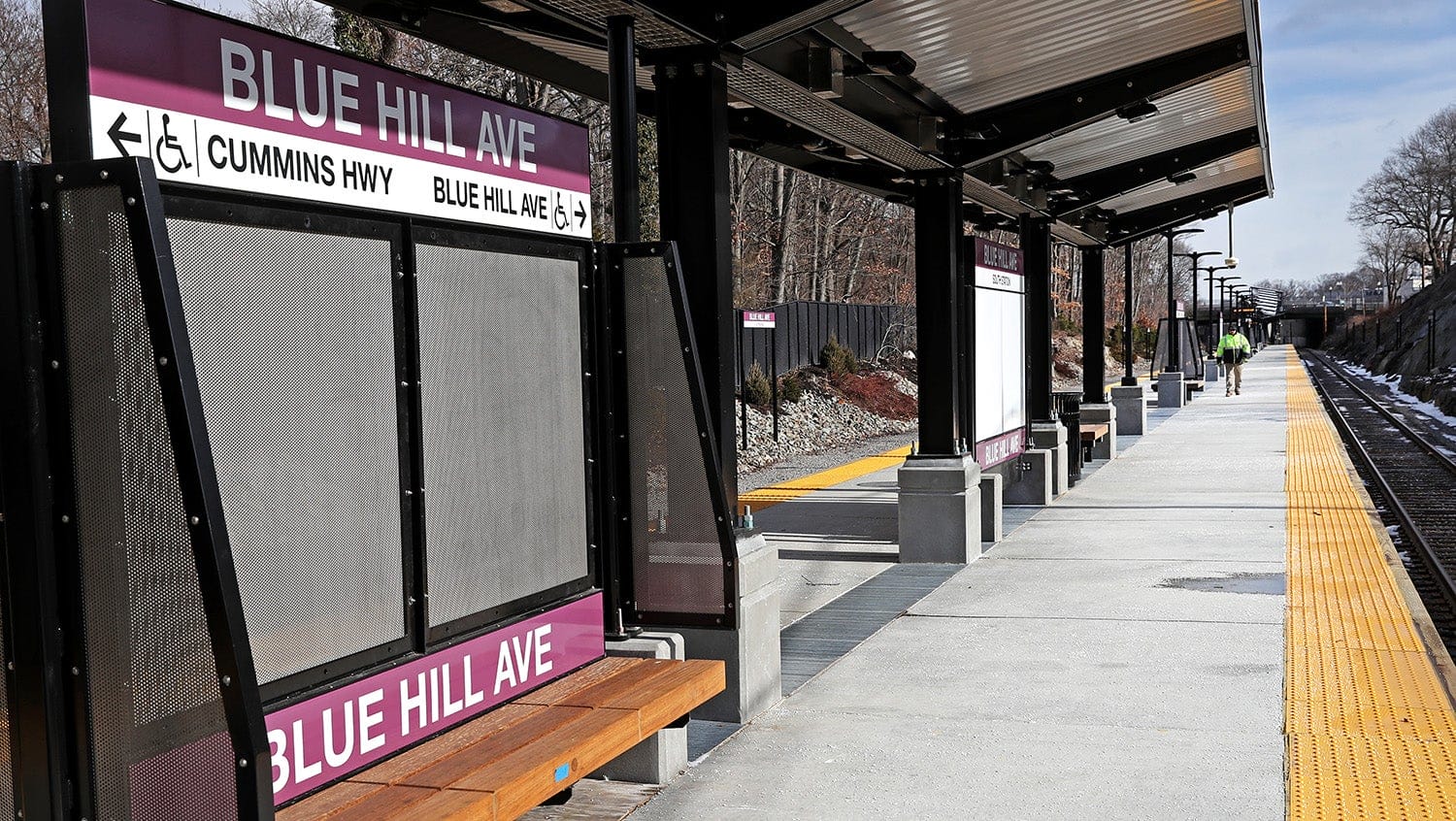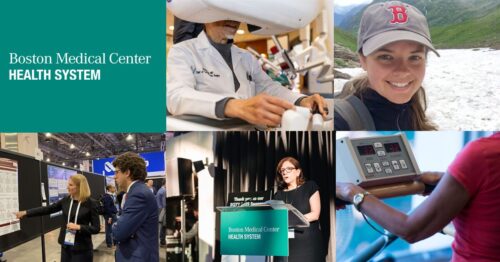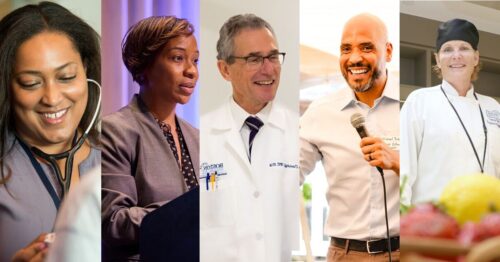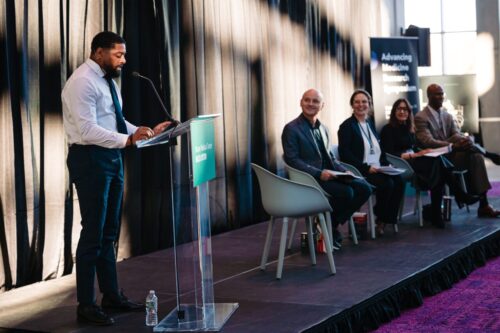New Collaboration Targets Key Boston Neighborhoods for Health Equity Initiatives
June 10, 2021
By Meryl Bailey

Boston Globe, Getty Images
Boston hospitals and organizations join forces to drive employment and housing programs in the city's most underserved neighborhoods with a focus on sustainable solutions.
On a map, the thin indigo line of the Fairmount MBTA bisects Boston, running south from the city center through the neighborhoods of Dorchester, Mattapan, and Hyde Park. The rail line connects some of the city’s most diverse, culturally vibrant, and historic districts—but also the city’s most marginalized and underserved. In the Fairmount Corridor, almost half of the households earn less than $40,000 per year, which is a staggering inequity compared to Boston’s median household income of $71,000. The concentrated poverty in these neighborhoods is a direct result of generations of disinvestment and historical trauma.
At Boston Medical Center (BMC), physicians are accustomed to treating the illnesses caused by living in low-income ZIP codes like those in the Fairmount Corridor: respiratory attacks triggered from inadequate housing; obesity resulting from a lack of fresh food options; depression from the stress of raising a family on minimum wage with no chance to earn more. These factors have nothing to do with people’s biology, yet they severely impact health trajectories and life expectancy and perpetuate a generational cycle of poverty and poor health.
Current systems and subsidies are designed to fill gaps temporarily rather than advance families toward sustainable livelihoods.
To sustain health equity, focus on specific zip codes
BMC pediatrician Megan Sandel, MD, MPH, believes to move toward true, sustainable advancements in health equity, health systems must directly address the disinvestment in communities of color and work to change systems that make economic opportunities, including living-wage jobs, inaccessible for so many.
“Place is where we concentrate inequity in this country. It is places and neighborhoods where systems don’t work and where policies perpetuate inequities,” Sandel says.
As a result, Sandel says that BMC as a health system is looking to extend work beyond the person-level to adopt a set of ZIP codes and make these ZIP codes how it focuses its work.
“Place-based investing, place-based hiring, and place-based small business procurement is part of our healthcare anchor mission,” Sandel explains. “We want Nubian Square, Roxbury, 02119, to be the healthiest neighborhood in Boston. There is no reason it can’t be. We just have to undo decades of racism to get there.”
Sandel is the principal investigator for The Boston Opportunity System (BOS) Collaborative, a new community-driven, systems-change approach to open pathways to employment and affordable housing options for people in Boston’s historically disinvested neighborhoods. Launched through an initial investment of a $5 million JP Morgan AdvancingCities Grant, the BOS Collaborative is a partnership between the City of Boston; large city hospitals, including BMC, Boston Children’s Hospital, and Brigham and Women’s Hospital; and community organizations Dudley Street Neighborhood Initiatives, Jewish Vocational Services, and Action for Equity.
Reinventing Boston’s job ecosystem with training and hiring
The collaborative’s goal is to radically reinvent the city’s jobs ecosystem by supporting people interested in new opportunities through skills training and the hiring process, ultimately helping launch them in new careers within the city’s anchor institutions. Much of the work will be offering holistic support so that people can stay and thrive in their new roles.
“When people begin to earn more money, they hit a ceiling when they are no longer eligible for certain governmental programs like SNAP, childcare subsidies, or housing subsidies,” describes Sandel. “We are going to be really intentional about how we tear down these barriers so people can be successful at every stage in the process. We are innovating in the system as we move forward.”
Residents living in Boston’s Fairmount Corridor will be the initiative’s primary focus. Before the COVID-19 pandemic dramatically changed the city’s job landscape, the Fairmount Corridor’s direct transit into the city was seen as a benefit to help employees commute to their new positions. Post-2020, the collaborative is focused on identifying recession-proof career paths that span the city’s major industries, including banking, life-sciences, tech, and healthcare. Although the BOS Collaborative’s three anchor institutions are currently hospitals, BOS Collaborative director Gina Patterson believes commitments from anchor institutions in other industries are crucial to create needed change and that these partnerships would be mutually beneficial.
“We know that besides San Francisco, Boston and Cambridge have the largest tech firms in the country. We also know the hiring and retention of Black and Brown people in the tech industry have been dismal. With the economic crisis caused by the pandemic and the serious racial reckoning in 2020, we think this is a huge opportunity for those companies to say ‘yes’ to the commitments that they have made to hire people of color. We want to help support them as we know there is plenty of talent within Mattapan, Dorchester, and Roxbury to help fill those positions,” Patterson explains.
Stewardship and collaboration are key for long-lasting health equity
The BOS Collaborative’s initial work aims to fulfill 500 jobs at a family-sustaining wage. Action for Equity is leading the work to recruit 1,100 people as candidates so that 500 can quickly be trained and hired into the career pipelines that anchor institutions and other downtown businesses will offer. Jewish Vocational Services will provide the necessary training for many roles and connect participants across many other job pipeline programs. The collaborative is also working with Dudley Street Neighborhood Initiative to leverage $1 million into more creative investment strategies for tangible neighborhood revitalization.
The effort to open opportunities for individuals and families to become more economically stable is a natural outgrowth of BMC’s, Boston Children’s, and Brigham and Women’s Innovative Stable Housing Initiative. The hospitals first partnered in 2019 to provide $3 million to preserve and create affordable housing in the Boston area. For both initiatives, the hospitals invested heavily in community partners doing the work on the ground. Sandel believes anchor institutions can effectively wield influence to create change yet also must lean back and let the community lead the way.
“Institutions need to change, not people,” says Sandel. “Community needs to lead. By building trusting, respectful relationships, we can make long-lasting change. We’re really trying to live that theory of change every single day in the BOS Collaborative.”


